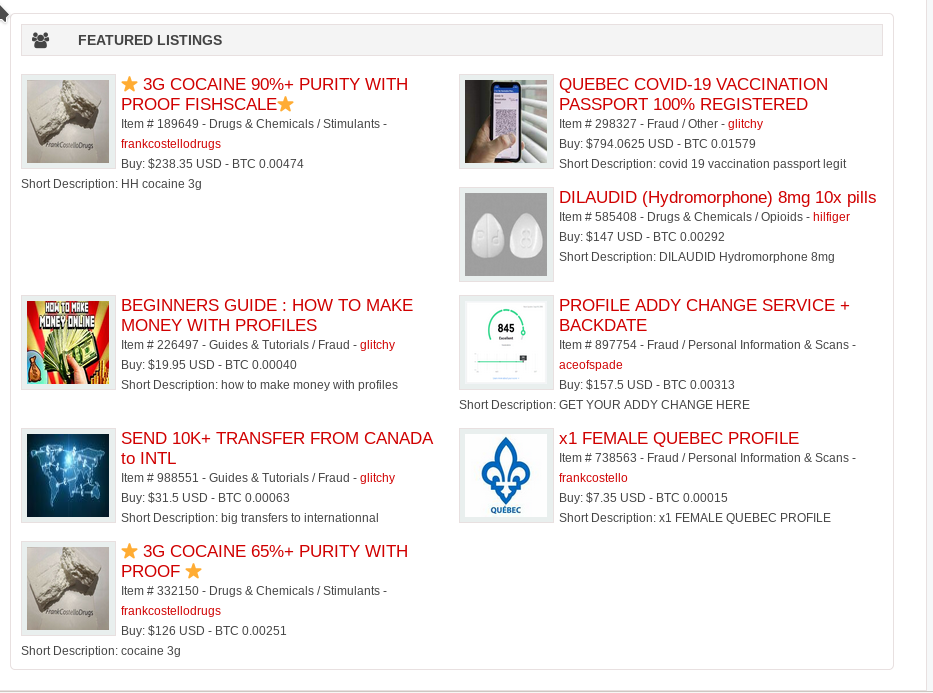This deep net has for a long time been a well spring of fascination and fear, wrapped in mystery and frequently portrayed as a refuge for illicit operations. Inside this hidden layer of the web lies a complicated ecosystem of dark web markets, where goods and services are traded under the veil of secrecy. Such platforms operate on the hidden internet, utilizing encryption technologies to safeguard the identities and privacy and deals of their users. As such, they present an interesting example of commerce that operates outside the traditional economic system.
In the past few years, the rise of these platforms has raised significant questions about the nature of online marketplaces, the motivations of their participants, and the consequences for authorities and the public. From illegal drugs and fake products to cybercrime services and sensitive information, the variety of products in underground markets is as expansive as it is concerning. Understanding how these platforms function is essential for grasping the issues they pose, not only to regulatory bodies but also to our view of security and trust in digital commerce.
Comprehending the Dark Web
The hidden web is a section of the internet that is not cataloged by standard search engines, making it relatively unreachable to the ordinary user. It operates on overlay networks, which require particular software, setups, or access rights to enter. The most frequent way to access the dark web is through the Tor network, which anonymizes user traffic by sending it through a chain of volunteer-run servers. This secrecy is a significant draw for users seeking seclusion, whether for lawful reasons or further nefarious activities.
Within this covert realm, there is a variety of marketplaces and forums where users can trade goods and services that may be illegal or hard to find on the surface web. These markets often facilitate the trade of drugs, weapons, counterfeit currency, and stolen data. Transactions are typically executed using cryptocurrencies, like Bitcoin, which offers another layer of secrecy and makes tracing difficult for law enforcement agencies. This distinct ecosystem prospers in secrecy, allowing individuals to operate with a level of risk that is not found in standard commerce.
While the dark web often holds a reputation solely for criminal activity, it also serves as a space for liberty of expression and information dissemination in tyrannical regimes. Whistleblowers and activists may use these networks to connect without concern of observation or repercussions. Thus, the dark web is a intricate and multifaceted space that embodies a combination of illicit trade and the fight for secrecy and freedom, presenting an captivating contrast within the online landscape.

Mechanisms of Darknet Markets
Underground markets operate on the foundations of anonymity and decentralized transactions, attracting individuals who seek to purchase and trade illegal goods and services without being tracked. These markets are typically hosted on systems like Tor or I2P, which mask users' IP addresses and secure their communications, making it challenging for law enforcement to monitor their activities. Vendors often create detailed listings, complete with reviews and comments, to establish credibility and faith within the community. This unique structure allows users to explore and choose from an array of listings, ranging from controlled substances to counterfeit documents.
Transactional systems in darknet markets heavily rely on digital currencies, primarily Bitcoin, to enable transactions while preserving participant anonymity. darknet market lists These digital currencies are selected for their pseudonymous nature, allowing buyers to purchase items without revealing their personal information. Some markets have developed their own escrow systems, which hold payments until the customer verifies receipt of the purchased items, further reducing the risk of fraud. This commitment to safety and privacy enhances user confidence and encourages engagement in these shadows of the internet.
To maintain their operations, darknet markets often utilize specialized discussion boards or communication channels for communication and marketing. These platforms serve as hubs for users to share information, talk about product quality, and relay experiences, creating a sense of community among buyers and sellers. In addition, many markets are constantly adapting, using sophisticated measures to evade law enforcement, which may include regularly changing URLs, using anti-DDoS measures, and implementing enhanced encryption protocols. This constant evolution is crucial for survival within the unstable landscape of the darknet.
Dangers and Legal Implications
Engaging in trades on black market websites involves significant risks that can impact not only individuals and society as a whole. Users often expose themselves to fraud, deception, and the potential loss of their personal data. Additionally, the privacy that these platforms offer can lead to a false sense of security, enticing individuals into making rash purchases of illegal goods or services without completely understanding the consequences.
From a lawful perspective, taking part in dark web markets carries serious implications. Law enforcement agencies are increasingly monitoring these platforms, and individuals caught purchasing or trading illegal items can face substantial fines, criminal charges, and extended prison sentences. Legal frameworks vary by country, but many jurisdictions handle activities on such markets very seriously, often leading to inquiries and stings on operators and users alike.
Additionally, the presence of illegal activities on dark web marketplaces contributes to wider societal issues, including the proliferation of drug abuse, trafficking, and cybercrime. These markets can enable the exchange of harmful substances and dangerous weapons, further perpetuating criminal enterprises. As authorities strive to combat these issues, the risks for those involved in dark web transactions continue to grow, making it essential for individuals to carefully consider their actions and the potential consequences.
